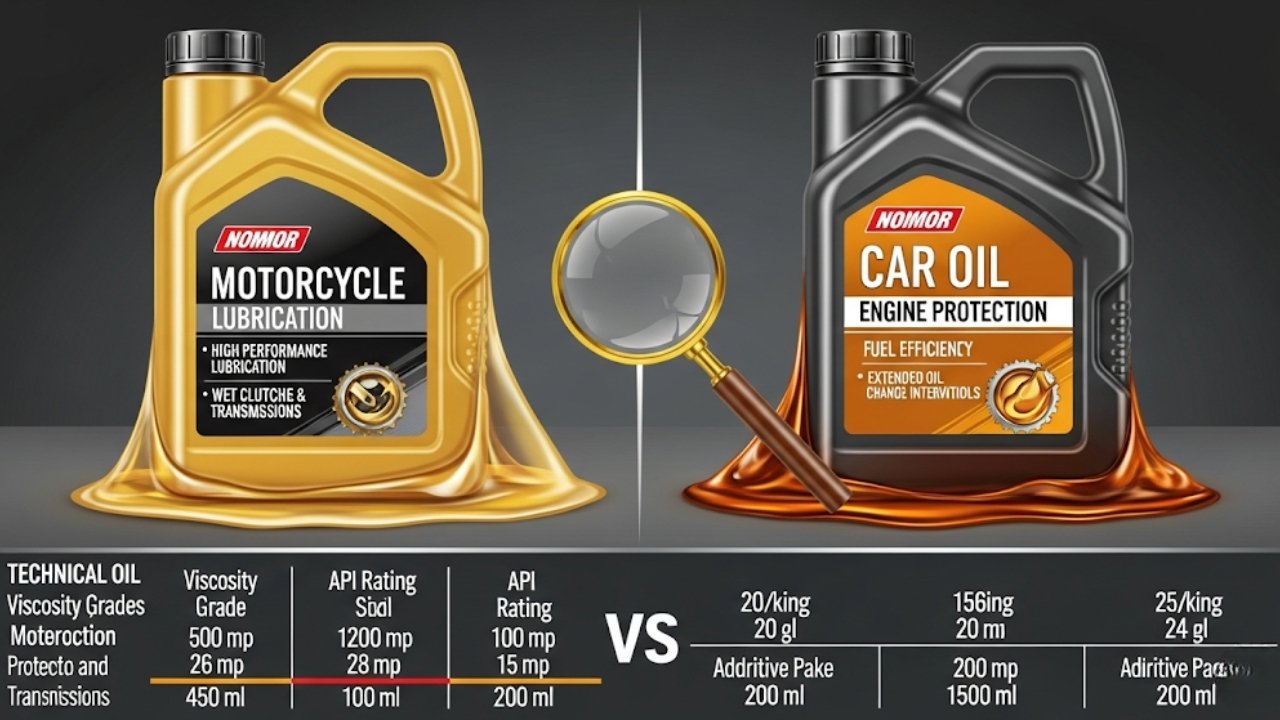Is Motorcycle Oil Different Than Car Oil? A Complete Guide

Ever poured car oil into your motorcycle because you thought, “Hey, oil is oil, right?” You’re not alone. A lot of people believe that since both vehicles use internal combustion engines, they can share the same oil. But here’s the kicker—using the wrong oil can seriously mess things up. It’s kind of like using shampoo as body wash—it might clean something, but it’s not designed for the whole job.
In this guide, we’re diving deep into the question: is motorcycle oil different than car oil? We’ll break it down in simple, everyday language. You’ll get all the facts—no fluff—and some personal stories along the way that might just save your engine (and wallet).
By the end of this article, you’ll know exactly why motorcycle oil is special, when you can swap it (if ever), and how to choose the right type. So, if you’ve ever stood in an auto parts store scratching your head, this one’s for you.
Understanding What Engine Oil Really Does

Engine oil is the lifeblood of your vehicle. It keeps things cool, reduces friction, and stops the metal parts inside the engine from grinding each other to bits.
Here’s what good engine oil does:
-
Lubricates moving parts
-
Cools the engine by carrying heat away
-
Cleans by collecting dirt and grime
-
Seals small gaps between metal parts
-
Protects against corrosion
Whether you’re riding a Yamaha or driving a Toyota, your engine is counting on that oil. But here’s the twist: motorcycle engines and car engines don’t work the same way, so their oils shouldn’t either.
Why Motorcycle Engines Are Built Differently
Let’s start with this: motorcycle engines are usually smaller but rev much higher than car engines. That means they work harder, run hotter, and often combine the engine, transmission, and clutch in a single oiling system.
Imagine trying to use a Swiss army knife to do a job meant for three different tools—that’s what motorcycle oil has to be capable of.
Here are a few key differences:
| Feature | Motorcycle Engine | Car Engine |
|---|---|---|
| RPM Range | Higher (up to 12,000+) | Lower (usually under 6,000) |
| Oil System | Shared engine, transmission, clutch | Separate systems |
| Oil Capacity | Less oil, more heat stress | More oil, lower stress |
| Cooling System | Often air-cooled | Mostly liquid-cooled |
So when people ask, is motorcycle oil different than car oil, the answer is yes—and now you’re starting to see why.
What’s Inside Motorcycle Oil That Makes It Special
Here’s where it gets juicy. The difference isn’t just in how it’s used—it’s also in how it’s formulated.
1. Additive Packages
Motorcycle oils use additives designed to:
-
Handle wet clutches (most bikes have them)
-
Work under extreme RPMs
-
Minimize friction without slipping
Car oils, on the other hand, often contain friction modifiers to improve fuel economy. But these modifiers can cause clutch slippage in motorcycles. Not cool.
2. Shear Stability
Bikes rev higher, which means the oil is more likely to get “sheared” (torn apart at the molecular level). Motorcycle oil is built to resist that.
3. Zinc and Phosphorus Content
Motorcycle oils often have higher levels of ZDDP (zinc and phosphorus anti-wear additives). These protect cams and gears, especially in older or performance bikes.
So again, if you’ve ever wondered, is motorcycle oil different than car oil, think about this: one oil is designed to work like a bodyguard in a bar fight. The other just needs to keep your family sedan humming to the grocery store.
The Danger of Using Car Oil in Your Motorcycle
Let’s talk consequences.
Wet Clutch Slippage
Many bikes use the same oil for the clutch. If you use car oil with friction modifiers, your clutch could start slipping. You’ll feel it—your bike won’t accelerate the same, even though the engine revs.
Gearbox Wear
Car oil isn’t made to handle the intense metal-on-metal contact inside a bike’s transmission. That means more wear, less protection, and a shorter engine life.
Overheating and Breakdown
Motorcycles heat up quickly, especially in traffic. Car oil may break down faster, losing viscosity and protection when you need it most.
Personal Anecdote
I once used regular 10W-40 car oil in my old Honda CB500 because I was broke and thought it wouldn’t matter. Within a week, the clutch started slipping like crazy. Took it to my mechanic and he just shook his head. “Cheap now, expensive later,” he said. Lesson learned.
When Can You Use Car Oil in a Motorcycle? (Rare Exceptions)
Let’s be honest: some older motorcycles without a wet clutch (like a few vintage 2-strokes or dry clutch Ducatis) can run fine on some car oils. But these are rare exceptions.
Also, if the car oil is labeled as JASO MA or MA2, it might be safe—it meets motorcycle specs.
Here’s a quick checklist:
✅ The oil is free from friction modifiers
✅ It meets JASO MA/MA2 standards
✅ Your bike’s manual allows it
❌ Your motorcycle has a wet clutch
But unless you’re 100% sure, stick to motorcycle-specific oil. It’s not just about performance—it’s about safety.
How to Choose the Right Motorcycle Oil
Now that we’ve answered, is motorcycle oil different than car oil, here’s how to pick the right one.
Check Your Manual
Always the first step. Your bike’s manual will tell you the correct oil weight and spec (like 10W-40, JASO MA2, etc.).
Look for JASO Ratings
This is key. Motorcycle oils carry JASO MA or MA2 labels, which means they’re tested for wet clutch compatibility and high-stress performance.
️ Match the Viscosity
Don’t guess. If your bike calls for 20W-50, don’t use 10W-30 just because it’s cheaper. The wrong viscosity can damage your engine in hot or cold weather.
️ Synthetic vs Mineral vs Semi-Synthetic
-
Mineral oils are cheaper but wear out fast
-
Semi-synthetics are a good mid-ground
-
Full synthetics last longer and protect better, especially at high temps
I personally use a synthetic 10W-40 in my current Yamaha MT-07. Costs more, but the smooth shifting and peace of mind? Worth every penny.
Bullet Recap: Key Differences Between Motorcycle and Car Oil
Here’s a quick summary to keep it easy:
-
Motorcycle oil = made for higher RPMs and wet clutches
-
Car oil = made for fuel economy and smooth operation
-
Motorcycle oil has special additives and higher ZDDP
-
Car oil can cause slippage and damage inside a bike
-
Motorcycles often use the same oil for engine, gearbox, and clutch
✅ Table: Quick Comparison of Motorcycle Oil vs Car Oil
| Feature | Motorcycle Oil | Car Oil |
|---|---|---|
| Wet Clutch Safe? | Yes (JASO MA/MA2) | No (unless JASO certified) |
| Friction Modifiers | Minimal or none | Often included |
| High RPM Resistance | High | Medium |
| Gearbox Protection | Yes | No |
| Shear Stability | Very High | Moderate |
| Zinc/Phosphorus Levels | Higher (protective) | Lower (emissions compliant) |
Synthetic vs. Mineral: What’s Best for Your Motorcycle?
You’ve probably seen different types of oil on the shelf: synthetic, mineral, and semi-synthetic. It can feel like standing in the shampoo aisle—way too many choices. So, what’s really best for your bike?
️ Mineral Oil
This is the most basic type. It’s refined from crude oil and contains fewer additives. It works fine for older or low-performance engines.
Pros:
-
Cheaper
-
Good for vintage bikes
Cons:
-
Breaks down faster
-
Poor protection at high temps
⚙️ Synthetic Oil
Made in labs with uniform molecules. It’s like the premium fuel of oils. Synthetic oil resists heat, keeps your engine cleaner, and lasts longer.
Pros:
-
Handles extreme heat
-
Reduces engine wear
-
Long-lasting
Cons:
-
Costs more
Semi-Synthetic Oil
A middle-ground option—part mineral, part synthetic. It gives you better protection than mineral oil without the full cost of synthetic.
If your bike is modern and sees daily use or high revs, go synthetic. If it’s an older, chill ride, mineral might be fine. But always check your owner’s manual first.
How Often Should You Change Motorcycle Oil?
Oil doesn’t last forever. Even the best stuff breaks down over time. But how often should you change it?
Here’s a general guide:
| Riding Type | Oil Change Interval |
|---|---|
| Daily commuting | Every 3,000–4,000 km (1,800–2,500 mi) |
| Weekend rides only | Every 6 months or 5,000 km |
| Aggressive riding/racing | Every 1,500–2,000 km (900–1,200 mi) |
| Synthetic oil users | Up to 7,000 km (if manual allows) |
Tip: Always change your oil filter when you change your oil. It’s like changing the water but leaving the dirty sponge.
If you ever asked yourself “is motorcycle oil different than car oil?” in terms of longevity, the answer is yes. Motorcycle oil degrades faster because it’s doing more jobs in harsher conditions.
Can Motorcycle Oil Be Used in a Car? (Short Answer: Not Recommended)
Let’s flip the question. Can you pour motorcycle oil into your car engine?
Technically, you can. The engine won’t explode, but it’s not ideal. Motorcycle oil is often more robust, but it may not have the right additives for emission systems in cars. It might also affect fuel economy and cause early wear.
Plus, it could mess with your catalytic converter, especially if it contains higher levels of zinc.
So, even though the question “is motorcycle oil different than car oil” swings both ways, the answer is still a firm yes. Each oil is tailored to the demands of its engine type.
FAQs: Your Most Common Oil Questions—Answered
1. Can I use car oil in my motorcycle once or twice in an emergency?
Yes, but only if it’s an emergency and for a very short distance. Make sure it has no friction modifiers and change it as soon as possible.
2. What does JASO MA or MA2 mean?
JASO is a Japanese standard. MA and MA2 mean the oil is safe for wet clutches, won’t cause slipping, and works under motorcycle-specific stress.
3. What happens if I use the wrong oil in my motorcycle?
You may experience:
-
Clutch slippage
-
Overheating
-
Faster engine wear
-
Rough shifting
It’s like using cooking oil in your car—something’s bound to fry.
4. Is thicker oil better for motorcycles?
Not always. Follow your manual. Using thicker oil than recommended may cause poor cold starts, drag, and even engine damage.
5. Is it worth paying more for synthetic motorcycle oil?
Absolutely, if you:
-
Ride in hot weather
-
Do long distances
-
Own a performance bike
-
Want better engine protection
Synthetic oil = peace of mind.
6. Can I mix car and motorcycle oils?
No. Different formulations can react in weird ways. It’s not just risky—it’s unnecessary.
7. Does oil color tell me when to change it?
Not really. Oil darkens as it works. Rely on your kilometers, manual, and oil quality instead of color alone.
8. How do I know if oil caused my clutch to slip?
You’ll notice:
-
Higher engine RPMs with less speed
-
Poor acceleration
-
Engine feels fine, but the bike struggles to move
If this happens after an oil change, it might be the wrong oil.
Final Thoughts: Respect the Ride
Your motorcycle isn’t just transportation—it’s freedom, passion, and adrenaline all wrapped in two wheels. And like anything you love, it deserves the right care. That’s why understanding is motorcycle oil different than car oil matters more than most riders realize.
I learned this lesson the hard way with an old Suzuki I used to ride around my college town. I thought saving a few bucks by using leftover car oil was smart. A week later, my clutch slipped in the middle of a hill climb, and I had to walk the bike home like a guilty parent.
So here’s the deal:
-
Don’t cut corners with your oil.
-
Always read your manual.
-
Stick to motorcycle-rated oil.
Your bike will thank you—with smoother rides, longer life, and fewer breakdowns.






